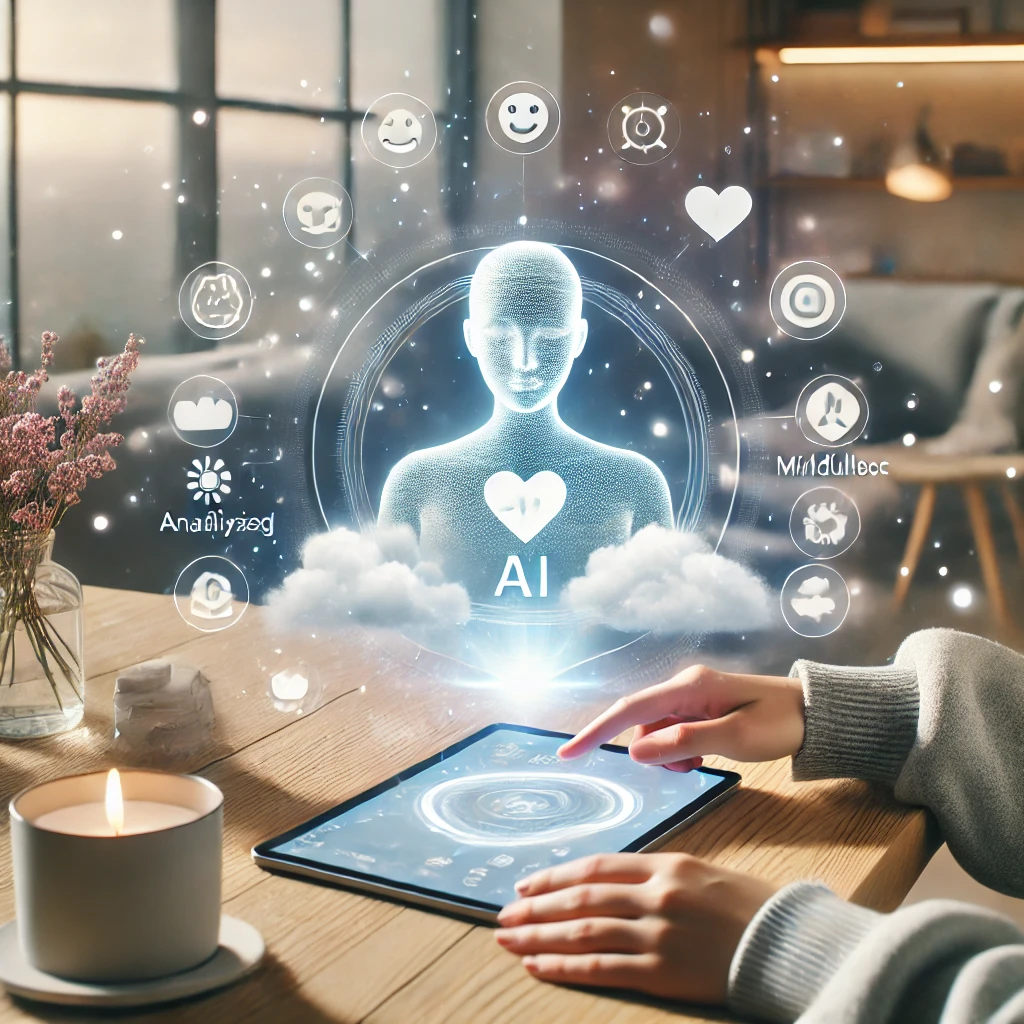Mental health concerns are on the rise, yet many people still struggle to find timely, customized help. Artificial Intelligence (AI) is transforming mental health care by offering personalized, data-driven support that fits each individual’s unique needs. Through sophisticated algorithms, natural language processing, and machine learning, AI-based mental health tools can aid in diagnosing conditions, tracking emotional states, and providing custom therapies.
Understanding Personalized AI-Driven Mental Health Support
Personalized AI mental health tools are apps or platforms that use machine learning algorithms to offer tailored mental health care. They examine user data to find patterns, suggest treatments, and give real-time feedback. By adapting to a person’s behavior, preferences, and mental health history, these tools can provide a level of care that generalized solutions often can’t match.
AI personalization in mental health care means the technology learns from each interaction, refining its recommendations to better meet individual needs. This can lead to more effective, empathetic support and higher user engagement, as the advice feels more relevant to their personal experiences.
Applications of AI in Personalized Mental Health Support
AI-driven personalized mental health support is being used in various ways:
AI Chatbots for Counseling and Emotional Support
AI chatbots like Woebot, Wysa, and Youper use natural language processing to have therapeutic conversations with users. These chatbots can mimic empathy, suggest evidence-based mental health exercises, and provide a nonjudgmental space for users to discuss their worries. As the chatbot learns from each session, it can make its responses more personalized, offering interventions that suit the user’s current emotional state and history.
Mood Tracking and Analysis
AI apps can monitor mood changes over time using data from user interactions, written entries, or even physiological data from wearables. By tracking mood, AI can alert users or their therapists to significant mood shifts, making it easier to intervene early if a mental health issue worsens.
Customized Therapy Recommendations
Based on how users interact and respond, AI platforms can suggest tailored therapeutic exercises like cognitive-behavioral techniques, mindfulness practices, or journaling prompts. For example, someone with social anxiety might get exercises focused on building confidence and relaxation techniques before social gatherings.
Predictive Analytics for Early Intervention
AI can analyze user data to detect patterns that may indicate an impending mental health crisis. By recognizing changes in speech patterns, online activity, or sleep data, AI can help predict and prevent depressive episodes or anxiety attacks. Predictive analytics can notify individuals, caregivers, or therapists, enabling proactive support rather than reactive measures.
Remote Monitoring and Support
Some AI platforms work with wearable devices to continuously monitor physiological indicators like heart rate variability, sleep patterns, and physical activity. This broad approach helps assess how lifestyle factors impact mental well-being, allowing users to see connections between physical health and mental health.
Benefits of AI-Driven Personalized Mental Health Support
The ability of AI to personalize care brings several benefits to mental health support:
Accessibility and Affordability
Personalized AI mental health tools are available anytime, anywhere, and are usually more affordable than traditional therapy.
Expanding Access to Mental Health Care
Accessing mental health care can be challenging, especially for those living in distant areas or facing financial constraints. AI tools offer a valuable alternative, making it easier for such individuals to get the help they need.
Reducing Stigma and Ensuring Privacy
For many, discussing mental health in person can be daunting. AI platforms create a private space where users can talk about their concerns without fear of judgment. This anonymity often encourages more people to seek the help they need.
Consistent, Immediate Support
Traditional therapy usually happens once a week. In contrast, AI tools provide ongoing support and timely check-ins. This real-time assistance helps individuals receive prompt advice and maintain their mental well-being.
Insights Through Data
AI can track a user’s emotional and behavioral patterns, offering insights that help in understanding mental health trends. This data can highlight triggers and show progress, aiding in better self-care.
Engaging With Therapy
Personalized AI support can be more engaging for users because it feels tailored to their unique situations. When people feel understood, they are more likely to engage with exercises and activities suggested by the app.
Challenges and Limitations
Privacy and Data Security
AI platforms must handle sensitive user data, making privacy a significant concern. Ensuring robust data security and compliance with regulations is essential to protect user trust.
Risk of Over-Reliance
While helpful, AI tools should not replace human therapists. They lack the empathy and deep understanding that human interaction provides, which is crucial for complex mental health issues.
Algorithmic Bias
AI systems may reflect biases present in the data they are trained on, potentially leading to unfair or ineffective support for some users. It’s important to use diverse datasets to ensure fair treatment for everyone.
Emotional Nuance
AI is improving but still can’t fully replicate human emotional intelligence. It may miss subtle cues like tone changes, limiting its ability to offer complete empathetic support.
Ethical and Regulatory Issues
Using AI in mental health raises questions about consent and user autonomy. People need to be aware of how their data is used and have control over their privacy settings.
Leading AI-Driven Mental Health Platforms
Woebot
Woebot is an AI conversational tool that offers mental health support through brief, personalized chats. It uses proven techniques like cognitive-behavioral therapy to help manage stress and depression.
Wysa
Combining AI conversations with exercises from various therapies, Wysa provides personalized tools and allows access to human therapists if needed.
Youper
Youper guides users through exercises based on their emotions, tracking mood patterns to offer insights and recommendations for managing feelings and building self-awareness.
Replika: An AI Companion for Emotional Support
While Replika isn’t solely dedicated to mental health, it offers users a personalized AI companion to converse with. Through empathetic dialogue, it learns from interactions to better adapt its responses, providing emotional support and companionship.
Future Directions for AI-Driven Mental Health Support
The future of AI in mental health looks promising, with potential for more personalized and supportive capabilities:
Integration with Wearables for Holistic Care: AI could soon work with wearables to deliver comprehensive mental health insights by analyzing real-time data such as heart rate, movements, and sleep patterns. By examining these indicators, AI could link physical and mental health, offering well-rounded recommendations.
AI-Augmented Therapy Sessions: In traditional therapy, AI can support therapists by providing data-driven insights and summaries of sessions, helping clinicians make better decisions. AI can also suggest personalized interventions and track patient progress between sessions, enhancing care continuity.
Developing Culturally Inclusive Algorithms: It’s crucial that AI tools offer relevant support across diverse populations. Future AI systems are expected to be trained on culturally and demographically varied datasets, resulting in more equitable and effective mental health support.
Predictive Mental Health Tools for Preventive Care: AI can analyze historical data to predict the risk of developing certain mental health conditions and offer preventive measures. This would shift mental health care from a reactive to a proactive approach, addressing issues before they become severe.
Personalized Virtual Support Groups: AI could create virtual support groups tailored to specific needs or mental health conditions, connecting individuals with similar experiences. It would monitor group dynamics and provide recommendations, ensuring these groups remain safe and effective.
Conclusion
AI-driven personalized mental health support is revolutionizing access to mental health care. By offering real-time, tailored guidance, AI helps individuals manage their mental well-being with support that is accessible, private, and adaptable to each person’s needs. Despite some limitations, advancements in AI continue to increase its role in mental health care, providing new tools for early intervention, ongoing support, and preventive care.
As AI’s role in mental health evolves, it’s vital to address ethical concerns, protect data privacy, and develop systems that prioritize empathy and inclusivity. With careful development and a focus on human-centered care, AI-driven mental health support can make mental health resources more accessible and effective, bridging gaps in traditional care and enhancing well-being for millions globally.







Leave a Reply